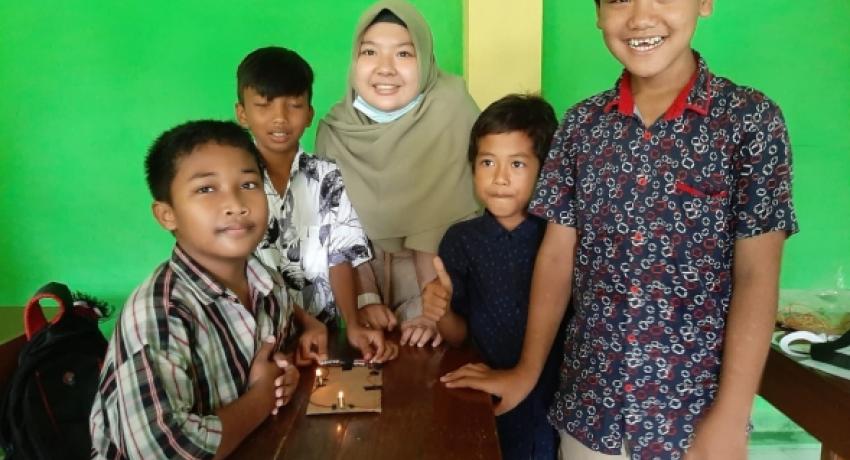The Teaching Campus Program (KM) is the flagship program of the Ministry of Education, Culture, Research, and Technology, which was initiated to save the learning motivation of elementary school students. This program selects 7000 of Indonesia's best students to be delegated to unaccredited elementary schools (SD) in the less developed area. One of the selected students in the selection of Teaching Campus program is Embun Ayudya, a student of the Sociology Education Study Program, Faculty of Social Sciences, Universitas Negeri Yogyakarta. In this program Embun was delegated at SD IT Maarif NU Gantiwarno Klaten, Central Java. At this school, Embun carries out the vision of the Teaching Campus program, namely the implementation of numeracy literacy, technology adaptation, and administrative assistance.
Embun teaches grades 3 and 4 with a contextual and innovative learning model. One of the innovative learning activities is the contextual application of electrical material by making simple electrical engineering in grade 4, collaborating with UAD Physics Education student Dwi Wahyuningtyas to apply electrical material with a thematic correlation of Energy and Its Changes.
At the beginning of the lesson, an example of an electric series model that must be compiled is given. Embun invites students to imagine how electricity can make lights turn on and explain the changes in chemical energy (batteries) into electricity and then light in the practicum. "Science material experiments make students better understand the material contextually; students can implement their imagination in learning activities in the classroom through this experiment," she explained.
Students are very enthusiastic about assembling the series even though they find it difficult. Embun and Tyas do not involve themselves too much in the student practicum process; this is intended so that students have high problem-solving initiative by making a lot of trial and error. "I let students explore all their curiosity, creativity, and collaboration with the group system and democracy for the discussions they have. This also supports the campus teaching program, namely the Pancasila student profile," said Embun.
After every group managed to turn on the lights from the electrical circuit they made, Embun asked each group to submit an analysis based on their previous experiment. "With presentation activities, we as teachers can see how students understand the material as a whole, and also learn to be confident by speaking and explaining their work," concluded Embun.





